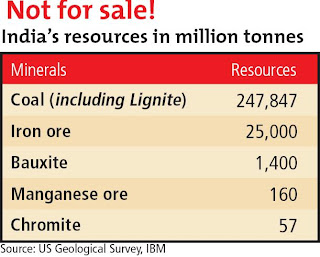 about 500,000 skilled & unskilled labour force by 2011.” If approved, it would allow 100% FDI in mining of all minerals, barring Coal, Lignite & atomic minerals. Furthermore, staterun agencies will be treated at par with private entities for the purpose of award of concessions. There will be no mandatory joint venture with local or state-owned companies for mining. The Secretary General of Federation of Indian Mineral Industries, R.K. Sharma, told B&E, “On the whole, it is a good step forward, but the auction of mineral deposits & provision of captive mines needs to be opposed.” He further added, “Tatas are sitting over 3,000 million tonnes of iron ore deposits & produce only about 5 million tonnes of steel; while SAIL, which has control over 5,000 million tonnes of steel, produces over 13.33 million tonnes of steel.”
about 500,000 skilled & unskilled labour force by 2011.” If approved, it would allow 100% FDI in mining of all minerals, barring Coal, Lignite & atomic minerals. Furthermore, staterun agencies will be treated at par with private entities for the purpose of award of concessions. There will be no mandatory joint venture with local or state-owned companies for mining. The Secretary General of Federation of Indian Mineral Industries, R.K. Sharma, told B&E, “On the whole, it is a good step forward, but the auction of mineral deposits & provision of captive mines needs to be opposed.” He further added, “Tatas are sitting over 3,000 million tonnes of iron ore deposits & produce only about 5 million tonnes of steel; while SAIL, which has control over 5,000 million tonnes of steel, produces over 13.33 million tonnes of steel.”Development needs to be promoted, but selling the assets of the nation at runaway price would be abominable & a breach of people’s trust in the state.
Source: IIPM Editorial, 2008
An IIPM and Management Guru Prof. Arindam Chaudhuri's Initiative



